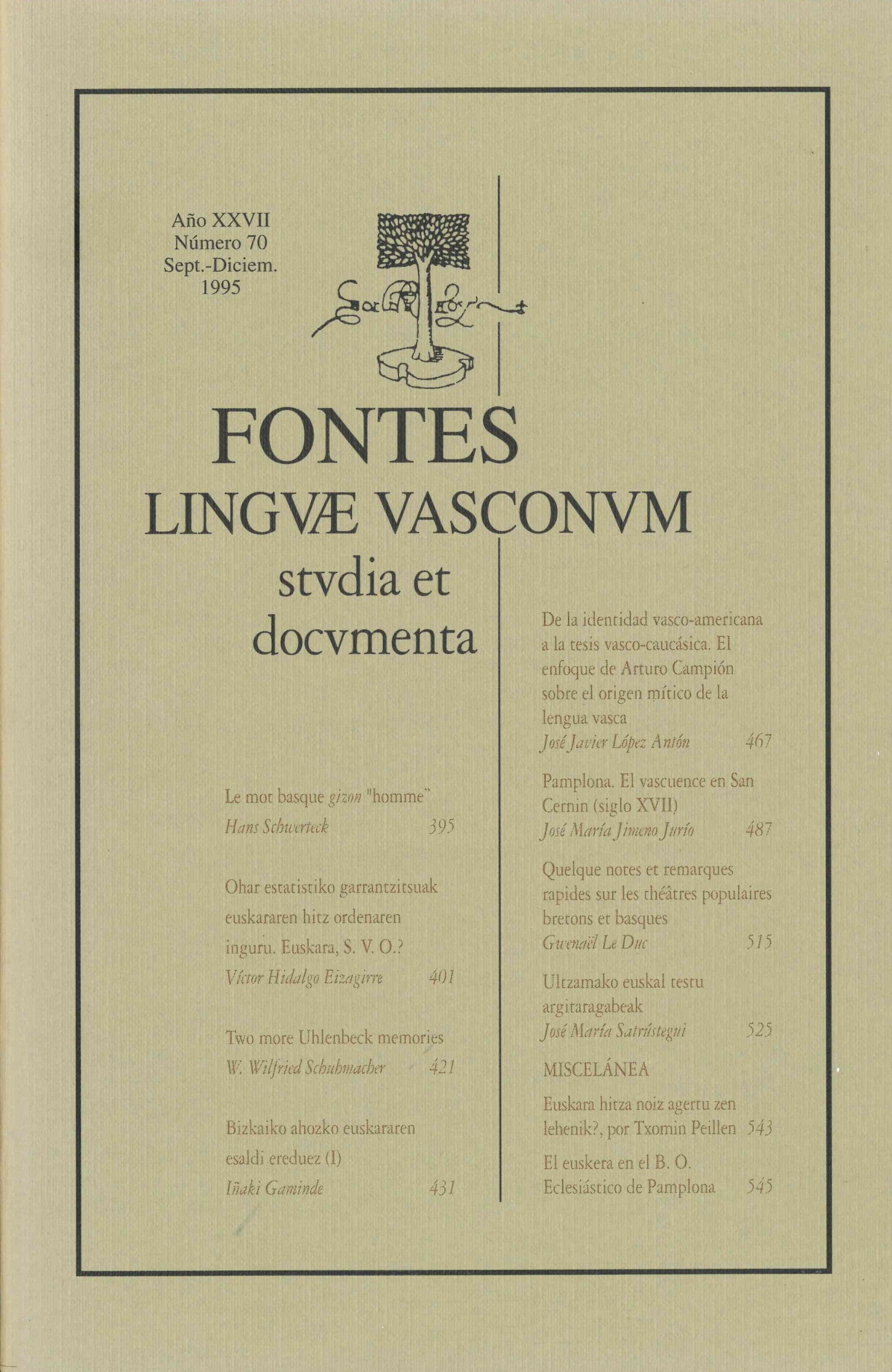Le mot basque gizon "homme"
Resumen
La palabra vasca gizon "hombre" tiene su origen en la forma indoeuropea *ĝhponios, al igual que las expresiones que para "hombre" se utilizan en las lenguas celtas, por ej. duine en irlandés. Sin embargo ello no significa que sea un préstamo del celta, sino que puede tener su origen en un idioma indoeuropeo mas antiguo llamado por J. Corominas sorotáptico.
Estadísticas
Referencias
M. AGUD/ A. TOVAR, Diccionario etimológico vasco, t. V, Donostia/San Sebastian 1992 = Anejos del Anuario del Seminario de Filología Vasca "Julio de Urquijo "XXX
K. BRUGMANN, Grundriß der vergleichenden Grammatik der indogermanischen Sprachen, 2. Bd., 1. Hälfte, Straßburg 1889.
J. COROMINAS, "El libro de Schmoll sobre las lenguas hispánicas prerromanas" dans Tópica Hespérica II, Madrid 1972, 236-282.
J. COROMINAS, "Dos notas epigráficas", Fontes Linguae Vasconum V (Nr. 13, 1973), 5-13.
J. COROMINAS, "Les Plombs Sorothaptiques d' Arles", Zeitschrift für Romanische Philologie 91 (1975), 1-53. https://doi.org/10.1515/zrph.1975.91.1-2.1
J. COROMINAS, "Els ploms sorotaptiques d'Arles" dans Entre dos llenguatges (3 vols), Barcelona 1976; c. II, 142-216.
J. COROMINAS, "Elementos prelatinos en las lenguas romances hispánicas" et "Acerca de algunas inscripciones del Noroeste" Actas del I coloquio sobre lenguas y culturas prerromanas de la Península Ibérica, Salamanca 1976, 87-164 et 361-385.
J. DE HOZ, "The Celts of the Iberian Peninsula", Zeitschrift für Ce!tische Philologie 45 (1992), 1-37. https://doi.org/10.1515/zcph.1992.45.1.1
N. HOLMER, "Las relaciones vasco-celtas desde el punto de vista linguistico", Boletín de la Real Sociedad Vascongada de Amigos del País VI (1950), 399-415.
L. MICHELENA, Fonética Histórica Vasca, 2ème ed, San Sebastián 1977.
L. MONTEAGUDO, "Orientales e indoeuropeos en la Iberia prehistórica", Actas del 111 Coloquio sobre lenguas y culturas palehispánicas, Salamanca 1985, 25-135.
J. MORRIS JONES, A Welsh Grammar, Oxford 1913.
M. MORVAN, "Note sur l'origine des noms des kirghizes", Fontes Linguae Vasconum 51 (1988), 17-18.
H. PEDERSEN, Vergleichende Grammatik der keltischen Sprachen, t. I, Göttingen 1909.
R. MENÉNDEZ PIDAL, Toponimia prerrománica hispana, Madrid 1952.
J. POKORNY, "Zur Urgeschichte der Kelten und Illyrer", Zeitschrift for Celtische Philologie 20 (1936), 314-352, 489-522; 21 (1938), 56-166. https://doi.org/10.1515/zcph.1936.20.1.489
J. POKORNY, lndogermanisches Etymologisches Worterbuch, Bern/München 1959.
K. H. SCHMIDT, "The Celtic Problem. Ethnogenesis (loction, date?)", Zeitschrifi for Celtische Philologie 45 (1992), 38-65. https://doi.org/10.1515/zcph.1992.45.1.38
H. SCHUCHARDT, "Zur methodischen Erforschung der Sprachverwandtschaft (Nubisch und Baskisch)" RIEV VI (1912), 267-281.
H. SCHUCHARDT, "Baskisch-kaukasische Wortvergleichungen", RIEV VII (1913), 289-340.
A. TOVAR, Estudios sobre fas primitivas lenguas hispánicas, Buenos Aires 1949.
A. TOVAR, "Indogermanisch, Keltisch, Keltiberisch", dans lndogermanisch und Ke!tisch. Kolloquium der Indogermanischen Gesellschaft am 16. und 17. Februar 1976 in Bonn. Vortrage unter Mitwirkung von Rolf Kodderitzsch herausgegeben von Karl Horst Schmidt. Wiesbaden 1977, 44-65.
A. TOVAR, "The Celts in the Iberian Península", dans Geschichte und Kultur der Kelten, ed. K. H. Schmidt, Heidelberg 1986, 68-101.
A. TOVAR, "The Basque Language and the Indo-European Spread to the West", dans lndo-European & lndo-Europeans, Univ. Pennsylvania 1970, 267-278. https://doi.org/10.9783/9781512801200-014
A TROMBETTI, Le origini della lingua basca, Bologna 1925.
H. WAGNER, "The Origins of the Celts in the Light of Linguistic Geography", dans Transactions of the Philological Society, London 1969, 203-250. https://doi.org/10.1111/j.1467-968X.1969.tb01269.x
Derechos de autor 1995 Hans Schwerteck

Esta obra está bajo licencia internacional Creative Commons Reconocimiento-NoComercial 4.0.







